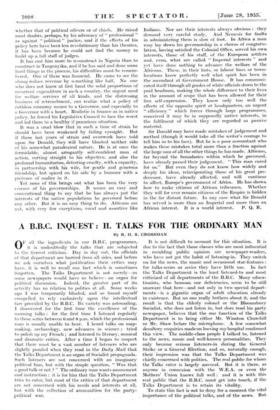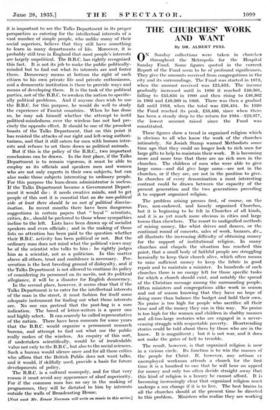A B.B.C. INQUEST : H. TALKS FOR THE ORDINARY MAN
By R. H. S. CROSSMAN OF . all the ingredients in our B.B.C. programmes,. it is. undoubtedly the talks that are subjected to the fiercest criticism. Day in day out, the officials of that department are harried. from all sides, and before we ask ourselves what justification. their critics may . have, it is well to recall one fact which is sometimes forgotten. The Talks Department is not merely—as some newspapers would have us believe--an organ for political discussion. Indeed, the greater part of its., activity has no relation to polities at all.. Some weeks ago I was temporarily blinded, and so found myself compelled to rely exclusively upon the intellectual.: fare provided by the B.B.C. Its variety was astounding. . I discovered for the first time the excellence of the morning talks : for the first time I listened, regularly - to those series between 6 and 8 p.m. which the professional . man is usually unable to hear. I heard talks on map- making, archaeology, new advances in science ; tried to polish up my French ; and listened to literary, musical and dramatic. critics. After a time I began. to suspect that there must. be a vast number of listeners who are slightly puzzled when they read in the Daily Mail that the Talks Department is an organ of Socialist propaganda. Such listeners are not concerned with an imaginary . political bias, but with the simple question,. " Was that a good talk or not ? " The ordinary man wants amusement . and instruction : it is for him that the Talks Department tries to cater, but most of the critics of that department are not concerned with his needs and interests at all, but with the collection of ammunition for the party- political war.. . • • It is not difficult to account for this situation.. It is due to the fact that those classes who are most influential in moulding public opinion are newspaper-readers, who have not got the habit of listening-in. They switch on, for the news,, the music and occasional star-features : for talks-series- as series. they have little use. In fact the Talks Department is the least listened-to and most criticized of all departments of the B.B:C. Many educe-, tionists, who bemoan our deficiencies, seem to be still unaware that here—and not only in two. special depart- ments—is a gigantic organ of adult education already in existence. But no one really bothers. about it, and the result is that the elderly colonel or the Bloomsbury Socialist, who does not listen in, but does read his party , newspaper,, believes that the one function of the Talks Department is to, bring, either Mr. Winston Churchill. or Mr. Shaw before the microphone: A few somewhat desultory enquiries made on leaving my hospital confirmed this view. The middle-class people I talked to listened eeslit'-ilminoTwihtens real personalities. They whom only became serious listeners-in during the. General Strike- or a. General Election, and so, naturally, enough, . concerned4eewpas meunswith.iteiasn I:t trei them impression was that the Talks Department; was the Talks cater is. largely unvocal. But it is there, as anyone in connexion with the' W.E.A. or even the Mothers' Union knows full well : and it is with this real public that the B.B:C. must get into touch, if the Talks tk To state this fact is not to deny. for a moment the vital importance of the political talks,, and of. the news, But. it is important to see the Talks Department in its proper perspective as catering for the intellectual interests of a vast number of simple people, who unlike many of their social superiors, believe that they still have something to learn in many departments of life. Moreover, it is probably still true in England that most people's interests are largely unpolitical. The B.B.C. has rightly recognized this fact. It is not its job to make the public politically- minded but to find out what its interests are and foster them. Democracy means at bottom the right of each citizen to his own private life and private enthusiasms, and a democratic institution is there to provide ways and means of developing them. It is the task of the political parties, not of the B.B.C. to awaken the nation to specific- ally political problems. And if anyone does wish to use the B.B.C. for this purpose, he would do well to study the experience of Fascist countries. When he has done so, he may ask himself whether the attempt to instil political-mindedness over the wireless, has not had pre- cisely the opposite effect. It should be one of the proudest boasts of the Talks Department, that on this point it has resisted the attacks of our right and left-wing authori- tarians, and that it still caters for men with human inter- ests and refuses to set them down as political animals.
But if this is the policy of the B.B.C., two important conclusions can be drawn. In the first place, if the Talks Department is to remain vigorous, it must be able to employ as its officials and speakers men and women who are not only experts in their own subjects, but can also make those subjects interesting to ordinary people. For this purpose the hum-drum administrator is useless. If the Talks Department became a Government Depart- ment it would die : it needs creative minds, and to get people of this sort it is essential that on the non-political side at least there should be no sort of political discrim- ination. In recent months there have been dangerous suggestions in certain papers that " loyal " scientists, critics, &c., should be preferred to those whose sympathies incline to the left. Lists have been drawn up of socialist speakers and even officials ; and in the making of those lists no attention has been paid to the question whether their B.B.C. activity has been political or not. But the ordinary man does not mind what the political views may be of the scientist who talks to him : he rightly judges him as a scientist, not as a politician. In this matter above all others, trust and confidence is necessary. Per- secution is the best breeding ground of disloyalty, and if the Talks Department is not allowed to continue its policy of considering its personnel on its merits, not its political allegiance, it will be a disaster for English democracy.
In the second place, however, it seems clear that if the Talks Department is to cater for the intellectual interests of the man in the street, it must fashion for itself some adequate instrument for finding out what those interests are. No one can pretend that the post-bag is a sure indication. The breed of letter-writers is a queer one and highly select. It can scarcely be called representative of the nation. There have been rumours for some years that the B.B.C. would organize a permanent research bureau, and attempt to find out what use the public really makes of the wireless. An enquiry of this sort, if undertaken scientifically, would be of incalculable value not only to the B.B.C., but also to the social sciences. Such a bureau would silence once and for all those critics who affirm that the British Public does not want talks, and it would, if skilfully used, provide a basis for future developments of policy. The B.B.C. is a cultural monopoly, and for that very reason it must avoid any appearance of aloof superiority. For if the common man has no say in the making of programmes, they will be dictated to him by interests outside the walls of Broadcasting House.
[Next week Mr. Ernest Newman will write on music in this series.]







































 Previous page
Previous page